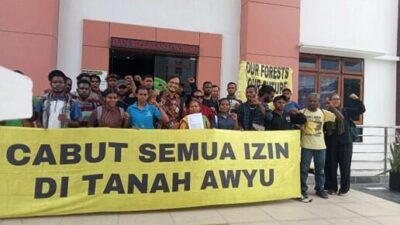Jayapura, Jubi – The government’s push for woody biomass as an eco-friendly solution to energy transition and carbon emissions reduction has faced criticism from 29 civil society organizations.
The use of woody biomass is promoted as carbon-neutral, assuming that carbon emissions from burning wood will be absorbed by new trees. However, the extensive expansion of timber plantations, also known as Energy Forest Plantations (HTE), to meet wood demand is leading to deforestation, excess emissions, land conflicts, and forest fires.
In a joint statement issued online on October 25, 2023, these organizations rejected the government’s reliance on wood biomass in its energy transition strategy.
Amalya Reza, the Bioenergy Program Manager at Trend Asia, highlighted that the concept of woody biomass being ‘carbon neutral’ hinges on the idea that emissions from biomass burning will be recaptured by timber plantations. However, at a large scale, the pace of combustion emissions will outstrip the growth of new trees, which will eventually be harvested.
Reza further pointed out that deforestation of natural forests contributes to additional emissions. The implementation of co-firing in 41 power plants, viewed as a heroic government action in the energy transition, is criticized as a form of greenwashing, implying it is a misleading public narrative.
In Indonesia’s mission to transition to clean energy and combat climate change, the government is striving to achieve a 23 percent target for the energy mix by 2023. They are actively promoting the use of wood pellets made from biomass, either for co-firing in power plants or for use in Biomass Power Plants.
Trend Asia’s research contradicts the government’s claims, arguing that the carbon-neutral assertion for biomass combustion is flawed.
“According to our calculations, burning wood pellets on this scale would result in 1,188,160 million tons of carbon-equivalent emissions,” she said.
Uli Arta Siagian, the National Forest and Plantation Campaign Manager at WALHI, argues that co-firing biomass with coal as a purported solution for clean energy transition only exacerbates the climate crisis and energy inequality. She calls for policies that prioritize people’s safety and environmental protection based on rights and recovery.
Meanwhile, Zainal Arifin, Chairman of the Advocacy Division of YLBHI, suggests that energy plantation forests and biomass co-firing are not genuine solutions but manipulative programs that could lead to human rights violations, particularly in power plant sites and communities struggling in forest areas.
Saiful Wathoni, from the Alliance for Agrarian Reform Movement, warns that Industrial Tree Plantations will increasingly encroach on people’s land and living spaces. He emphasizes that renewable energy is not just about the form of energy but also its purpose and beneficiaries. (*)














